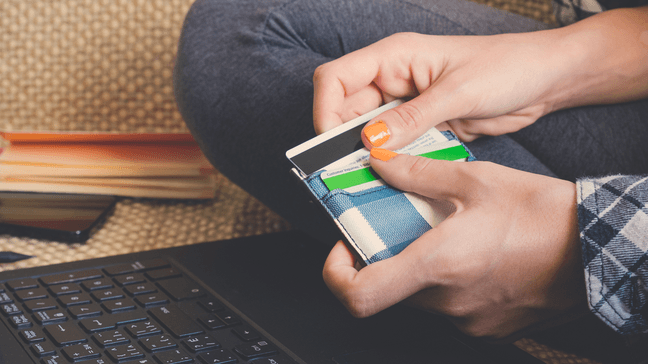Between the ages of 18 and 25, I racked up nearly $80,000 of debt – about half of it on credit cards – before aggressively paying it all off in about three years.
You might think that experience would have made me a debit and cash guy for life. As it turns out, I still pay for nearly everything with credit cards.
I just use credit cards responsibly now.
How credit cards work

A credit card is a revolving line of credit that allows you to make charges at any time (up to the amount of a specific credit limit).
Before you learn how to use credit cards responsibly, you’ll need to know how they really work in the first place.
You make a purchase
When you swipe your credit card, your bank “loans” you the money to make that purchase. Then, you choose how much to repay each month. Typically, you’ll have the following options:
- Make a minimum monthly payment.
- Make a partial payment.
- Pay off your entire balance.
With few exceptions, responsible credit card users always pay their balances in full every month.
You take advantage of the grace period
After you make a purchase with your credit card, the bank gives you a grace period, typically between 20 and 30 days, during which you can pay off that purchase before interest begins to accrue.
Grace periods are powerful because they give you the opportunity to use your credit card as a short, but interest-free, loan. As long as you pay every penny you charged last month before the due date, you won’t pay interest on credit card purchases.
Where things tend to go wrong
Sooner or later, however, many people do not pay their credit card balance in full each month, turning their credit card into a revolving credit line.
Finance charges (interest) then accumulate on the unpaid credit card balance every single month.
Best case, a little credit card debt costs a few hundred dollars in interest charges before you escape. Worst case, you depend more and more on credit cards to keep pace with damage caused by using them in the first place.
Failure to make payments makes your credit score plummet and adds a late fee to your balance. With bad credit, you could have trouble getting a car loan or an apartment lease. You might even end up in bankruptcy.
Ultimately, it ends nowhere good.
Here’s how to use credit cards responsibly

Don’t use a credit card if you can’t handle it
If you want to use a credit card responsibly, your first step should be to not use one IF you know you’re going to overspend. Credit card debt is a serious issue, and one that continues to build on itself if the user continues to spend and not pay off their full bill on time.
It’s 100% okay to put off using a credit card if you know you’re not great at managing your money (you do need to learn how to do that, though).
Build credit with timely payments
Maybe you’re super responsible and promptly pay all your bills 100% of the time. Regardless, you’ll still have trouble getting a loan later in life if you don’t have a consistent payment record on both loans and credit cards.
To improve your credit score, get a credit card and put a couple of purchases on it each month. For example, maybe you buy just a tank of gas and a take-out dinner, and your total amounts to less than $80. Every month when you get the bill, pay off the entire thing immediately. You should even consider setting up an automatic payment so you don’t have to remember on your own each month to pay your bill.
Since the balance will be paid within the grace period, you won’t pay interest. Payments are reported to the three credit bureaus, so every time you pay your bill on time and in full, you build credit.
The idea that you must pay interest or carry a balance to build credit is a myth. With every on-time payment, you’re automatically building credit. But if you don’t use your card, there’s no payment on your record.
So be sure to make purchases on a routine basis if you can. Don’t go overboard, though. This will up your credit utilization (aka, how much of your available credit you’re using), which will, in turn, lower your credit score.
Earn cash back or other rewards
Lots of people have credit cards to earn cash back or travel rewards on purchases. When managed correctly, credit cards can actually earn you hundreds of dollars a year just for using them for everyday purchases.
To really benefit, use one or more cash back or rewards credit cards for almost everything you buy every month. If you spend $2,000 a month for all the various expenses that can be put on a card and get 2% back, that’s $40 back in your pocket each month – or $480 a year.
Don’t be fooled by a few common traps, though:
- To win at this game, avoid spending more than you can afford and pay your total purchases off in full at the end of each billing period. Once you start paying interest, you miss out on any value from the rewards because the interest exceeds it. Discipline is everything.
- Chasing rewards can be counterproductive. Think carefully about your purchases so you don’t buy more than usual. The temptation is to think, “It’s okay because I’m getting cash back.”
- Finally, don’t stress about which rewards credit card to get. If your spending habits are average, it doesn’t really matter which rewards card you get – they all shake out about the same. And, if you can’t even qualify for a rewards card yet, start with a secured credit card instead (here are a few recommendations).
Track your discretionary spending
A credit card can become a cash flow tool to help you manage monthly spending. With most of your expenses on one card, you can easily see your total spent to date by viewing your account online. You can also check your discretionary spending and see if you’re having a good month or if you need to slow down on purchases.
Often you can view spending categories as well, since most credit card companies automatically categorize your spending for you. The categories help you identify areas where your money went, such as food, gasoline, or clothing.
Combined with a Bank Account Buffer™, emergency fund, and good cash flow management, using a credit card can simplify your daily life because you don’t need to obsess about your checking account balance on a daily basis.
Yes, you’ll want to know the maximum you can spend on your credit card each month, but if your checking account is low because tomorrow is payday and you must make a big purchase today, you can use a credit card without worrying about overdrawing your account and incurring a $40 fee.
This is a danger zone, however. The difference between credit cards helping or harming your cash flow is the discipline to set a spending limit.
Pay for a large purchase over time
Credit cards let you pay off a big purchase over time, which is a form of financing. But unless you’re using a card with a 0% intro APR, it’s an expensive way to pay.
Considering using a credit card to pay off a large purchase over a number of months? Consider your options carefully:
- Can you save up the money ahead of time and pay cash?
- Can you qualify for a credit card that offers a 0% intro APR on purchases for 12 months or longer – and pay it off before the rate skyrockets?
- Would a personal loan be a more affordable way to finance the purchase than a credit card?
Do NOT borrow money at regular credit card interest rates if you can help it. Unfortunately, I totally get that there are times in life when no other options will work.
To soften the blow, look for a card with the lowest interest rate you can get and figure out how to pay it off ASAP.
You can also make it easier on yourself if you don’t put anything else on that card until your purchase is paid off. That way you won’t get trapped into adding to your debt.
Feel secure with access to an emergency line of credit
If you don’t trust yourself to use credit cards regularly, know that about yourself and don’t use them.
But if you don’t have an emergency fund – which is common for college students and recent graduates – it might help to have a credit card ready for emergencies.
Simply open a card and use it a couple of times a year so there’s activity on the account. That way it won’t get closed.
Each time you use it, pay it off right away. If you’re uncomfortable that the credit limit the bank gives you is too high, you can call and ask that they lower it. That way, you’ll keep the spending danger low but still have something to fall back on.
Get fraud and purchase protection
One of the benefits of credit cards is fraud protection. If your credit card is hacked – which happens pretty often – money isn’t coming out of your bank account, and you don’t have to pay for bogus charges.
While debit card fraud is eventually refunded, that money still comes out of your account at first. This is one of the big reasons you should rethink using your debit card as your primary form of payment.
Credit cards also come with purchase protection. If a merchant doesn’t come through, you’ll get your money back.
For example, I have a friend who put a $1,000 deposit on a piece of furniture he never got because the company went out of business. They took his deposit, but because he put it on the credit card, the bank refunded it.
The benefits of using a credit card responsibly

Many people avoid credit cards today. They think,
“If I never have a credit card, I won’t get into a bad situation.”
But a majority of people who use credit cards never get into debt with them.
Responsible, strategic credit card use that benefits you – and not a credit card company – is within your reach. Your methods depend on your purposes for using a credit card.
You might want to build credit, earn rewards, track cash flow or use a card for other reasons.
How credit card companies make (lots of) money
The credit card companies earn a little bit of money every time you use your card because they charge stores one to 3% of your purchase – called an interchange fee – to accept the card. This is how they can afford to pay back rewards on every $1 you spend – they’re just giving you a rebate of their own fees.
But, as you’ve likely surmised by this point, the banks earn the biggest dollars by charging interest when you carry a balance – in other words, you don’t pay off your purchases in full at the end of the month.
Credit cards typically charge interest rates between 10% and 30%. So, with interest at a 15% annual percentage rate (APR), if you charge $500 to your card that you don’t pay off for a year, you’ll end up paying the bank $75 in interest. If you owe $5,000 that’s $750 a year in interest. Charge $50,000 and you’ll pay $7,500 a year just in interest!
The minimum payment trap
The worst part is that credit card companies make it easy to get into this situation by only requiring you to pay a small minimum payment each month, usually between 2% and 5% of your balance. So until you hit your card’s credit limit – the most the bank will let you borrow – it’s very easy to charge a large balance that’s difficult or impossible for you to pay off.
If you’re in this situation, you may be able to do a balance transfer in which you transfer your balances to a new credit card that has a 0% APR for the first few months. This is a tool credit card companies use to get you to switch from one card to another – of course, they hope that you will continue to pay them interest after the promotional 0% APR expires.
Whatever you do, if you get stuck with a credit card balance you can’t immediately pay off, you need to make and follow a plan for getting out of debt like I did.
Summary
It’s true – credit cards can be dangerous. But you can use a credit card responsibly and never pay a dime.
And there are many good reasons to do so. Credit cards:
- Are instrumental in building a good credit history.
- Can give you between 1% and 2% back on every purchase.
- Make it easy to track your discretionary spending in one place and manage your cash flow.
- Offer a backup to emergency savings.
- Provide greater fraud and purchase protection than debit cards.

